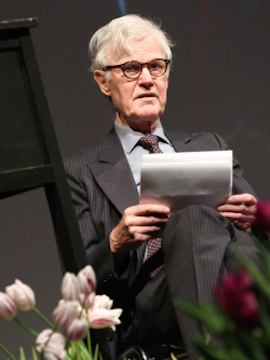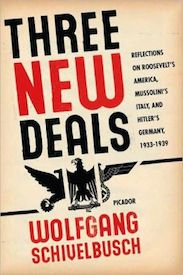Three New Deals
Though a commonplace in the 1930s, the links among Fascism, Nazism, and the New Deal are now a taboo topic. Yet it is only by seeing what German Nazism and Italian Fascism shared with the New Deal that we can understand why those two totalitarian regimes exerted so profound a hold on their populations. Now, in “Three New Deals: Reflections on Roosevelt’s America, Mussolini’s Italy, and Hitler’s Germany, 1933-1939,” Wolfgang Schivelbusch investigates the shared elements of these three new deals to offer a striking explanation for the popularity of Europe’s totalitarian systems.
Returning to the Depression years, Schivelbusch traces the emergence of a new type of state: bolstered by mass propaganda, led by a charismatic figure, and projecting stability and power. He uncovers stunning similarities among the three regimes, including:
- the symbolic importance of gigantic public works programs like the TVA dams and the German autobahn, which not only put people back to work but embodied state authority
- the seductive persuasiveness of Roosevelt’s fireside chats and Mussolini’s radio talks
- the vogue for monumental architecture stamped on Washington, as on Berlin
- the cult of the common man (Volk) and the heartland
- and the omnipresent banners enlisting citizens as loyal followers of the state.
Writing with flair and concision, Schivelbusch does not equate Roosevelt, Hitler, and Mussolini or minimize their acute differences. Rather, he explores their similarities both to deepen our understanding of the New Deal and put forward a provocative explanation for the still-mysterious hold of Europe’s most tyrannical regimes.
“What Schivelbusch brings out is the change in the role and conception of political leadership. Gone was the notion that those in political office were executors of constitutionally limited responsibilities. Now the ‘leader’ spoke and led outside the ordinary restraints of the political process. … Wolfgang Schivelbusch has reminded us that the danger of concentrated political power was understood back in the 1930s. We should pay attention today.” – The Freeman
- The Author

Wolfgang Schivelbusch
Cultural historian Wolfgang Schivelbusch studied comparative literature, philosophy and sociology in Frankfurt and Berlin and received his PhD from Freie […] More about Wolfgang Schivelbusch.














